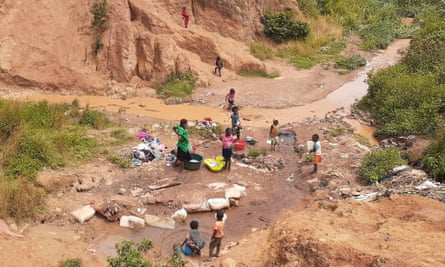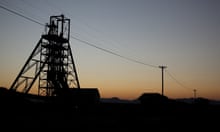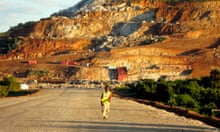Women and girls living in cobalt-mining communities in the Democratic Republic of the Congo are reporting a “staggering” rise in serious reproductive health issues, including miscarriages and birth defects, according to a new report.
An investigation published by the UK-based human rights group Rights & Accountability in Development (Raid) and the Kinshasa-based NGO Afrewatch said that women and girls living around cobalt mines reported experiencing irregular menstruations, urogenital infections, vaginal mycoses and warts.
According to the report, “a paediatrician, who has been recording patients’ data since 2016, explained that the rates of genital infections and skin pathologies among female patients had exploded. She believed this was because these populations are the primary users of ‘unclean water’, making them particularly vulnerable to diseases.”
In total, 144 people living in 25 communities near five industrial cobalt mines were interviewed as part of the study. More than half of all interviewees (56%), raised concerns about their own reproductive health or that of family members.
Anaïs Tobalagba, a legal and policy researcher at Raid and the report’s lead researcher, told the Guardian: “One of the most striking findings that we discovered was the differentiated impact on women. We knew there had been research linking cobalt mining to reproductive health issues. But we did not know the scope of it until we began these interviews.”
Anneke Van Woudenberg, the executive director of Raid, said: “I’ve worked in the DRC for 25 years and men are often reluctant to discuss female health issues. But men were also saying, ‘something is going wrong with our women’.”
Cobalt is used to make batteries for a number of household items, including electric vehicles. Transition to green energy has driven increased production in cobalt mines over the past decade.

A link between cobalt mining and birth defects has been raised in a Lancet study from 2020 that found the risk of birth defects greatly increased when a parent worked in a copper or cobalt mine.
Women are more likely to come in to daily contact with contaminated water than men, said Van Woudenberg. “They’re not drinking the water but they bathe in it, wash their clothes, household cleaning – all things women are doing. And medical experts have told us that that when the pH level of water is lower, gynaecological issues are more likely.”
Raid and Afrewatch also asked the University of Lubumbashi’s toxicology and environment unit to look examine water samples taken from the Dipeta River; the Katapula, Kalenge and Dilala-UCK rivers, and Lake Kando – the five water bodies identified by local residents as being problematic.
“While the research is still ongoing, preliminary results from March 2024 show that water pH for all of the rivers and the lake assessed is low,” said Van Woudenberg. “The scientists said this was a clear sign that these water bodies are affected by acidified industrial pollution. The scientific researchers assess that, given their acidity levels, the rivers have become unable to host fish, and that their water is toxic for human and animal health.”
Van Woudenberg said Raid had shared its findings with the mining companies located across the copper belt. In response, the companies outlined their commitment to comply with environmental laws and independent auditing, and pointed to the number of cleaner water pumps that they provide to local people.
The report said: “While this partly alleviates the chronic shortage of clean water, our investigation found that none of the mining companies had provided the minimal number of water points required by DRC regulations. Nor did they meet the World Health Organization’s guideline of 20 litres per person per day, the bare minimum required for drinking and basic hygiene.”
Another of the findings, Tobalagba said, was that 75% of people interviewed said that they can’t afford healthcare any more.
“People are becoming poorer because they rely on fishing and agriculture, but because the water is so polluted, the fishing stocks have diminished and crops grown along the water banks have begun to fail,” she said.








